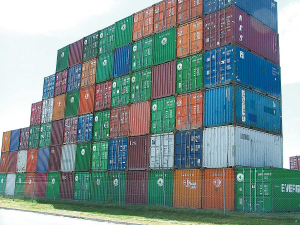Fonterra slashes forecast milk price, again
Fonterra has slashed another 50c off its milk price forecast as global milk flows shows no sign of easing.
 NZ's two largest dairy exporters say disruptions to global shipping hasn't affected their ability to get products to customers.
NZ's two largest dairy exporters say disruptions to global shipping hasn't affected their ability to get products to customers.
The country's two largest dairy exporters say disruptions to global shipping hasn’t affected their ability to get products to customers.
Global supply chains have been sluggish since Covid-19: the difficulty and cost of getting a spot on air or sea transport is becoming onerous and the availability of shipping containers has also become an issue for some companies.
But for major dairy exporters Fonterra and Open Country Dairy, exports have been holding up well.
Fonterra’s director global supply chain, Gordon Carlyle, told Rural News that despite some disruptions in the global supply chain, the co-operative was still getting products to its customers.
“Our partnership with (global supply chain collaborator) Kotahi and (shipping company) Maersk continues to prove hugely valuable,” he says.
“Availability of shipping containers has been an issue at certain times and locations, however, this has been short-lived and we are able to source what we need to support our exports.”
Open Country Dairy’s chief executive Steve Koekemoer told farmer suppliers that shipping lines and ports have had a few disruptions, which have been causing havoc with many exporters.
“Our supply chain team are closely managing the process to prevent delays and I have full trust in the team’s ability to deliver on the lofty goal.”
Despite the shipping woes, OCD is reporting a record-breaking season.
“I’m excited and proud to see our processing teams up and down the country continue to break production record after production record.
“All this product need to be shipped, which means that we, if everything works to plan, are also heading towards a record shipping month this November,” he says.
International flights out of New Zealand have dropped from about 600 a week to about 120, nearly halving air freight volumes, particularly hurting exporters of time-sensitive perishables.
ASB senior economist Jane Turner is surprised how well New Zealand goods exports have held up relative to goods imports during the pandemic.
“As an exporter, New Zealand is vulnerable to a fall in global demand – although one of the key lessons is that the fall in demand has not been evenly shared across economic sectors.
“With countries resorting to lockdowns once the virus spread escalates, demand for types of goods has shifted.
“For example, from eating out to eating at home – putting pressure on wholesale supply chains to quickly divert food from restaurants to supermarkets and meal kit delivery services.
“Likewise, less money is spent on commuting, but more money has been spent on technology to improve the home office. With NZ’s exports of goods skewed toward food, and given the world still needs to eat, NZ exports held up relatively well to date.”
Mating wrapped up last month at the across-breed Beef Progeny Test on Pāmu’s Kepler Farm in Manapouri.
Libby Judson is a keeper of memories from an age gone by. Tim Fulton tells her story.
A New Zealand-first native tree study has highlighted the Bioeconomy Science Institute's position as a forestry research leader.
Hemp fibre processor Rubisco is relocating its core processing facility to Ashburton as part of a $20-$30 million expansion to leverage what it says is an accelerating global demand for sustainable and renewable fibres.
Tradition meets some of the latest in technology at the 2026 East Coast Farming Expo.
OPINION: Trade Minister Todd McClay and the trade negotiator in government have presented Kiwis with an amazing gift for 2026 - a long awaited and critical free trade deal with India.

OPINION: If the hand-wringing, cravat and bow-tie wearing commentariat of a left-leaning persuasion had any influence on global markets, we'd…
OPINION: With Winston Peters playing politics with the PM's Indian FTA, all eyes will be on Labour who have the…